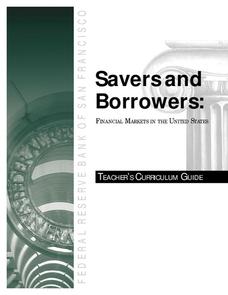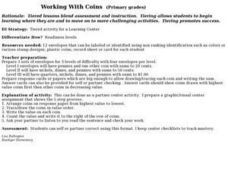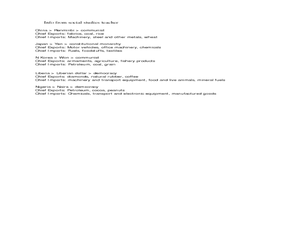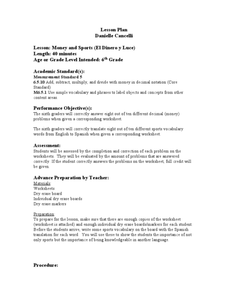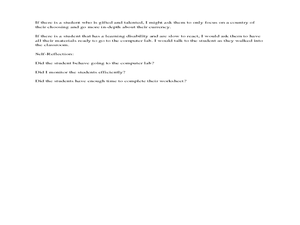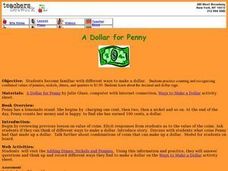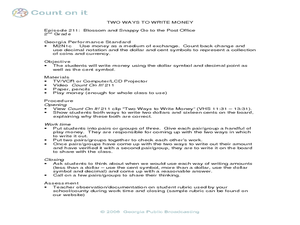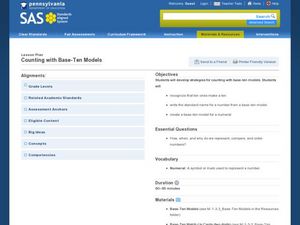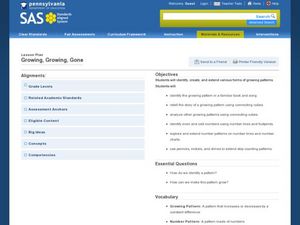Curated OER
Fractions - Equal or Not
A fabulous lesson plan on fractions awaits your young mathematicians. In it, learners are invited to explore the world of fractions by accessing websites that have educational activities and worksheets embedded in them. Some excellent,...
Curated OER
Savers & Borrowers: Financial Markets in the United States
Investigate the current financial market and have your class explore savings, borrowing, financial markets, mutual funds, and the stock market. This four-part lesson is designed to help young scholars become knowledgeable and informed...
Illinois State Board of Education
Solar System
Aspiring astronomers solve problems involving mixed units of the same attribute, including time, money, length, and area. They convert large numbers into scientific notation, then compute and compare ratios to explain why drawing...
Curated OER
Math-Money
Students complete money matching worksheet. They work with an aid or peer tutor with coin tray, name each coin shown (use native language or alternative speech method). Alternative assessment methods are used.
Curated OER
Working With Coins
Students arrange coins based on their value. In this coins lesson, students trace and record the value of each coin. Students count up to find the total value of all the coins.
Curated OER
Changing the Currency of Different Countries
Seventh graders explore changing currency. In this international math lesson, 7th graders will write and solve 2-step equations in order to convert currencies between nations. Students will research prices of items and currency...
Curated OER
Money and Sports
Sixth graders translate sports vocabulary words from English to Spanish and complete money problems containing decimals. In this money and sports lesson plan, 6th graders use words to communicate to each other.
Curated OER
Value of Money
Second graders examine a collection of coins to discover their value. In this value of money lesson, 2nd graders identify the amount of money represented by each coin. Students use a worksheet to complete story problems involving...
Curated OER
Technology: Money Equivalency
First graders,working on computers, drag coins into boxes to equal amounts pictured. Following a demonstration, they demonstrate how to type number sentences. As an extension, 1st graders create equivalent amounts using specific numbers...
Curated OER
Currency and Exchanges Rates
Seventh graders examine currency rates. In this exchange rate lesson, 7th graders visit selected websites to determine the exchange rates between specified currencies.
Curated OER
Math & Science
Students are introduced to techniques to help with with math and science. In groups, they use a worksheet to discover how to count money. As a class, they watch a PowerPoint to define terms associated with science. To end the lesson,...
Curated OER
Deena's Lucky Penny
Students discover the coin denominations of U.S. Currency. In this money lesson plan, students read the book Deena's Lucky Penny, then complete a coin matching activity using the Internet. Students also read Shel...
Curated OER
A Dollar for Penny
Students demonstrate different ways to make a dollar. In this consumer math lesson, students read the book A Dollar for Penny and identify the value of each coin. Students determine combinations of coins that can make up a dollar.
Curated OER
The Big Buck Adventure
Students practice making change, and adding and subtracting money. In this money lesson, students listen to a reading of The Big Buck Adventure by Shelley Gil. They access teacher assigned web sites to practice making change, adding...
Curated OER
Shopping for Candy
Students explore counting money. For this money counting and gingerbread house construction lesson, students use a calculator to determine how much and what type of candy they can buy given 25 cents. Students construct gingerbread...
Curated OER
The Cube and Coin Challenges
Second graders participate in several games based on colored cubes and coins. They try to figure out the relative rate at which things happen and assess the concept of playing a fair game with their peers. Each student compare familiar...
Virginia Department of Education
Probability
Classes explore different scenarios using manipulatives to learn about the difference between independent and dependent probability. Learners experiment with colored chips to model the two types of probabilities. To test their...
Illustrative Mathematics
Buying Protein Bars and Magazines
Packing for a trip? This activity allows learners to decide how many magazines and protein bars they can buy with twenty dollars. They can organize their work in a chart to track how many items they can purchase. There are two different...
Federal Reserve Bank
Creditors’ Criteria and Borrowers’ Rights and Responsibilities
Discover what criteria creditors use for making loans (the 3 Cs of Credit), and impress upon your young adults the rights and responsibilities related to using credit. Pupils role play as individuals seeking or providing credit, as...
Curated OER
Budgeting Money
Students explore the concept of budgeting. In this budgeting lesson, students pick an occupation and develop a list of needs and wants. Students make a list of monthly expenses and budget their income to afford those expenses.
Curated OER
Two Ways to Write Money
Second graders complete activities to learn about money and how to write money. In this money lesson plan, 2nd graders watch a video about ways to write money. Students work in groups with play money and come up with two ways to write...
Curated OER
Money Matters: The Importance of Global Cooperation
Students explore the International Monetary Fund (IMF). In this global economics lesson, students prepare for a field trip to the IMF as they examine the history of the IMF and their role in global trade.
Curated OER
Counting with Base - Ten Models
Help your kids develop strategies for counting. In this base-ten lesson, learners use matching cards, base 10 blocks, and dry erase markers and boards to examine the base 10 counting system.
Curated OER
Growing, Growing, Gone
Budding mathematicians identify growing patterns in numbers and songs then create their own patterns. They look at number patterns and language patterns and then create their own using money and footprints.

